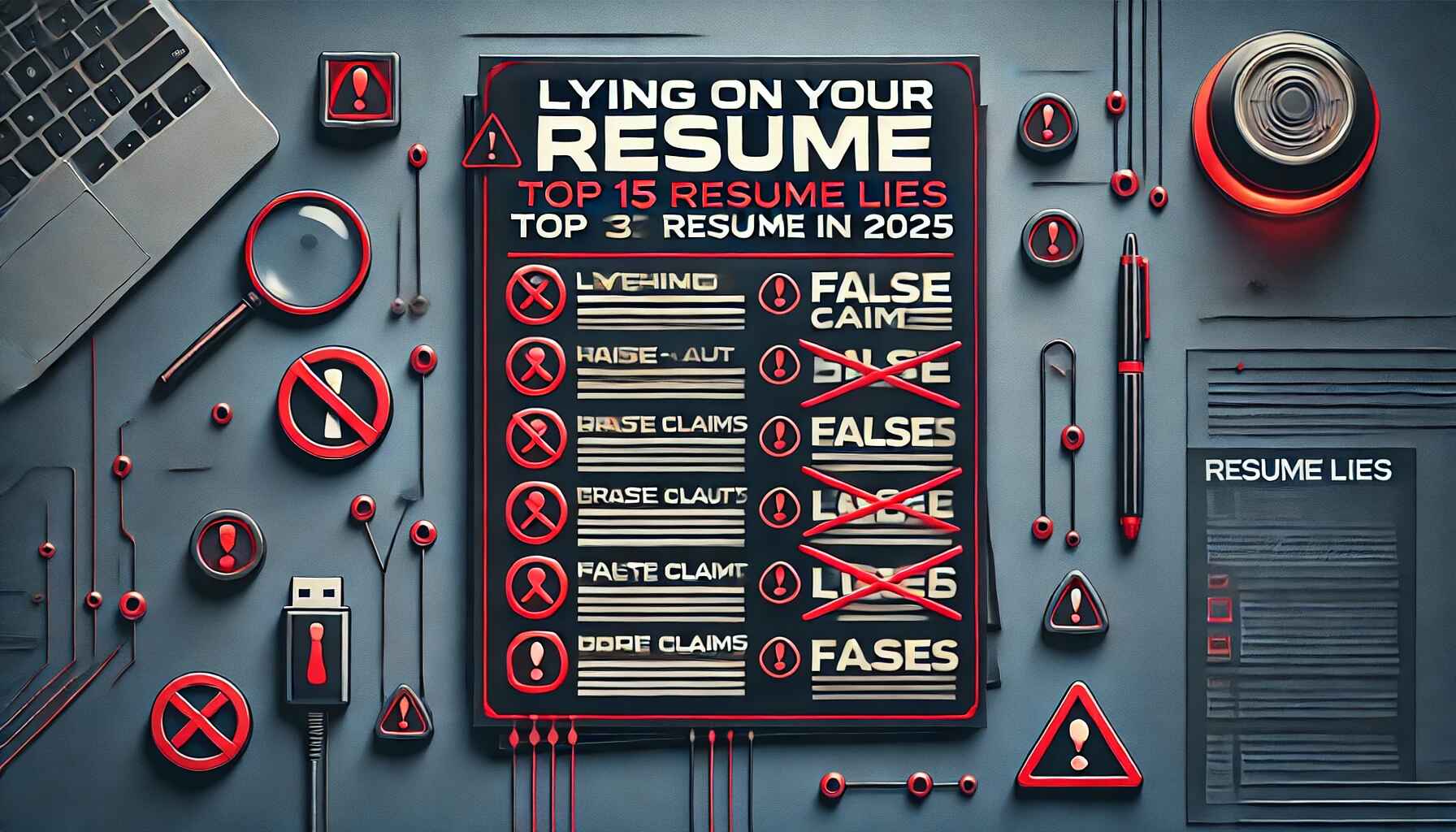Lying On Your Resume: Top 15 Resume Lies In 2025
In 2025, the job market is competitive, and many job seekers are tempted to exaggerate or lie on their resumes to gain an edge. While these lies may seem harmless at first, they can have severe consequences on your career. In this article, we’ll dive into the top 15 resume lies to avoid and explain why honesty is always the best policy.
1. Inflating Job Titles 📈
One of the most common lies on resumes is exaggerating job titles. It might seem harmless to change a job title to make it sound more impressive, but employers can verify these details. If caught, it could cost you the job, or worse, your professional reputation. Always be truthful about your role.
2. Exaggerating Skills and Qualifications 🎓
Claiming to have advanced knowledge or skills in a certain area is another mistake. Many candidates list skills they don’t possess, thinking they can learn on the job. However, hiring managers can easily test for proficiency. It’s always better to list only the skills you truly have.
3. Falsifying Education 📚
Some candidates may lie about their academic qualifications, claiming they graduated from a certain university or degree program they never attended. This is a serious offense that could result in immediate disqualification from a job application. It’s essential to list your actual educational background and experience.
4. Fabricating Work Experience 🏢
Falsifying your work experience by adding jobs you never held can backfire quickly. Employers will often verify employment history with previous employers. Even if the lie isn’t caught immediately, it can come to light later, potentially damaging your credibility and career.
5. Overstating Achievements 🏆
Many people exaggerate their accomplishments in previous jobs, claiming to have spearheaded major projects or contributed significantly to company growth. While confidence is key, it’s crucial not to overstate your contributions. Stick to the facts and let your actual achievements speak for themselves.
6. Falsifying Dates of Employment 📅
Some candidates try to extend their previous job tenure by altering the dates they worked at a particular company. This is a risky move, as many companies conduct background checks. Employers expect honesty, so it’s always better to list accurate dates.
7. Pretending to Know a Foreign Language 🌍
Listing a foreign language on your resume that you don’t actually speak is a common mistake. Hiring managers may test your language skills during the interview or at a later stage. It’s essential to be truthful about your abilities. If you're a beginner or intermediate speaker, mention that instead.
8. Claiming Leadership Experience Without Evidence 🧑💼
Some candidates claim they’ve managed teams or led projects when, in reality, they only held a junior role. Be sure to mention leadership roles you have genuinely held. Fabricating leadership experience can damage your chances of landing the job, especially for managerial positions.
9. Overstating Your Salary History 💸
Some job seekers lie about their past salaries to justify asking for a higher compensation package. However, many companies verify this information with previous employers. Misleading an employer about salary history can lead to mistrust and even disqualification from the job.
10. Pretending to Have Certifications 🛠️
Many resumes list certifications and professional development courses that candidates haven’t completed. Employers can verify these qualifications, so it’s best to only list certifications you have earned. If you're in the process of earning one, it’s okay to mention that, but don’t claim it until you have it in hand.
11. Misrepresenting Job Responsibilities 🔍
Some candidates exaggerate their day-to-day tasks to make them appear more impressive. Listing responsibilities that were not part of your job could be a red flag for employers, especially if they ask you to elaborate during the interview. Always keep it accurate and true to your role.
12. Claiming to Work for a High-Profile Company 🌟
Job seekers sometimes embellish their resumes by claiming they worked for prestigious companies. While this may seem like a way to impress hiring managers, it’s easy to verify and could backfire. Always list the companies where you’ve actually worked.
13. Lying About Volunteer Work 👐
Volunteer work can be a great addition to a resume, but claiming to have done volunteer work you didn’t is a mistake. Hiring managers value authenticity, and lying about volunteer experience can raise doubts about your honesty.
14. Altering References 📇
Sometimes, candidates alter or list fake references to back up their claims. However, employers may contact references, and if they can’t verify your details, it can be a deal-breaker. Always provide real and trustworthy references who can vouch for your work ethic.
15. Claiming to Have No Gaps in Employment ⏳
Some candidates try to hide employment gaps by altering their resumes or leaving out certain periods of time. It’s essential to be transparent about any gaps and explain them if necessary. Employers understand that life happens, and honesty is always the best policy.
Why Honesty is the Best Policy ✔️
It might be tempting to embellish or lie on your resume, but the risks far outweigh the benefits. Employers value honesty and integrity, and getting caught in a lie can severely damage your career. Instead of fabricating information, focus on highlighting your true skills and accomplishments. Always aim to present yourself authentically, and remember that there’s no substitute for genuine experience and qualifications.
Conclusion 📝
In 2025, resume lying may seem like an easy shortcut, but the potential consequences are far too significant. By sticking to the truth and showcasing your real strengths, you’ll set yourself up for long-term career success. Stay honest, and let your true abilities shine through!









